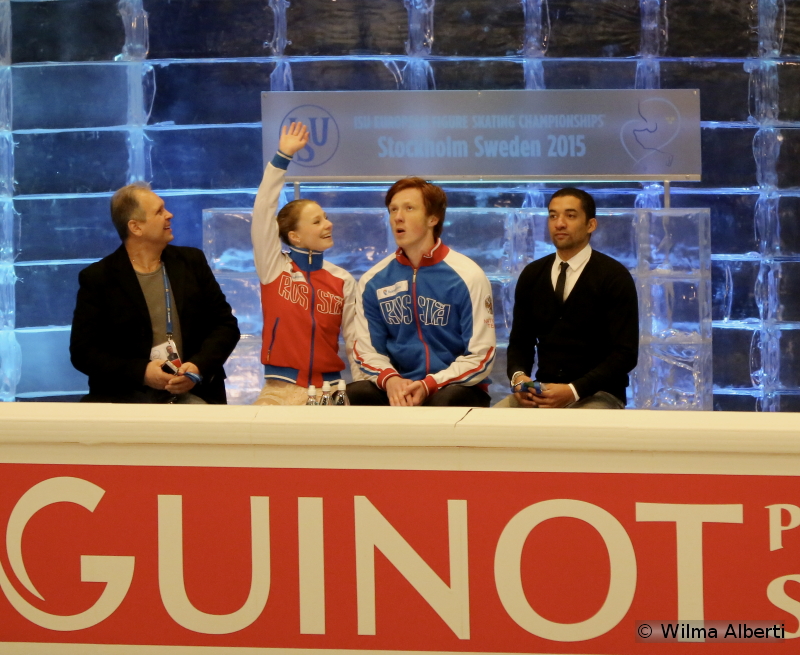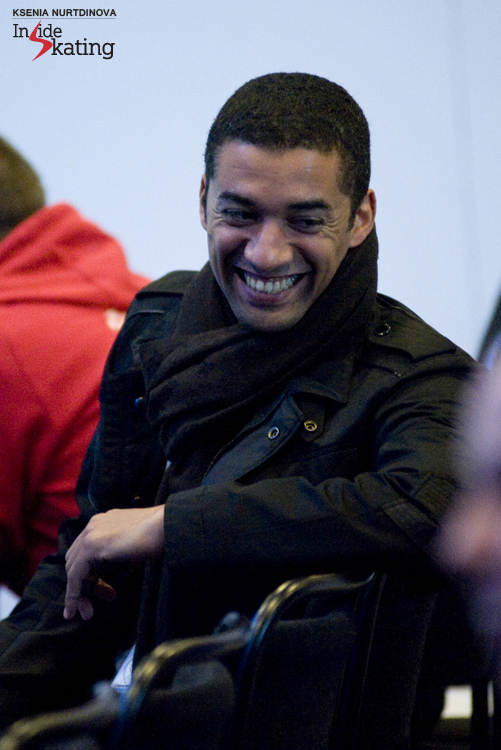
A new role for Robin Szolkowy at this year’s edition of the Europeans: standing alongside Evgenia Tarasova and Vladimir Morozov in the Kiss and Cry (January, Stockholm)
Last year in Budapest, Robin Szolkowy was still competing with Aliona Savchenko, in the tenth European Championships of their career; actually, from 2005, the year of their debut, till 2014, they entered every edition of the continental competition – even if, on two occasions, they were forced to withdraw during the event due to aggravating injury (2012) and illness (2014). This year, in Stockholm, with no break at all between two consecutive editions of the Europeans, Robin won his first medal as a coach, a bronze, standing alongside Evgenia Tarasova and Vladimir Morozov, a young and very promising pair from Russia; and this was, probably, one of the fastest (and most successful) transitions from competitive skating to coaching in the history of figure skating.
This particular discussion focuses exactly on Robin Szolkowy’s relation with the Europeans, his metamorphosis from skater to coach, his time in Stockholm with his students. And, as in his competitive career, you’ll discover a beautiful person and a very modest coach: “I see myself more like a friend, a supporter, a person you can talk to and ask some questions, whatever it is about. There are a lot more things to deal with [in pair skating] than doing the elements”.
by Florentina Tone
Robin, for the last ten years you never missed an edition of the Europeans: starting 2005, you’ve been a permanent presence as a competitor and, this year, you came in Stockholm as a coach. It is as if the Europeans can’t happen in your absence… Was this particular transition, from skating to coaching, easy? Haven’t you felt tempted to go and practice in Stockholm, to get ready to compete…?
Robin Szolkowy: Of course it felt strange to be back at Europeans after no break. If somebody would have told me in April 2014 that I would be at Europeans 2015 as a coach I would have shaken my head and asked for another joke.
Actually, the sportsmen, Evgenia and Vladimir, made it easy for me to go there. Because I knew they had a chance to win a medal. And so there wasn’t a big gap between my skating success and theirs. It is much easier to go teach and go to competition with somebody who just needs the last 5% to be a champion – especially when it is my first year on the other side.
And I never had the feeling that I wanted to skate myself. My time of competitive skating is over. And I enjoy my life so much as it is right now. I am really thankful for Nina Mozer’s trust to „give“ me such a good pair team and let me work with them. I want to help younger skaters to improve their skating skills, help them to deal with everything that can happen when you skate in the high class level.
All in all, this particular change, from competitive skating to coaching, seemed very smooth: from your own victories with Aliona at the Europeans throughout the years you finished the event in Stockholm winning the bronze medal with Evgenia and Vladimir, your first medal as a coach. You wrote on facebook at the end of the pairs event: “Goosebumps and wet hands and, at the end, a great 3rd place – congrats to Evgenia and Vladimir!”. Would you like to tell me more about this very successful (and surely emotional) experience?
Of course, it’s not easy to meet young skaters with skills and then tell them what to do and not to do. I see myself more like a friend, a supporter, a person you can talk to and ask some questions – whatever it is about. This is very important. There are a lot more things to deal with than doing the elements. So I think that Evgenia, Vladimir and I found a good way of communication – even if I don’t speak Russian so far. And as I would not call me a coach yet – for that I need many more years of learning – I stood there in Stockholm knowing what these two skaters were able to show. The short program was easy for me. But the free was hard. I was really nervous. Maybe it was because they did some mistakes in the short and I wished for them to have a really good free to get their medal.

The podium in the pairs event at this year’s edition of the Europeans: Robin’s students, Evgenia and Vladimir (right), took the bronze
You finished your first Europeans (2005, Turin) on the 4th place. In their debut at the Europeans, your students won the bronze. Would you predict for Evgenia and Vladimir a career as successful as yours and Aliona’s? In other words, which are their strengths, how is it to work with them?
They are really good students. They are listening. And they are thinking about the elements and their sport. At the end, they have everything for a great career. But it is always a matter of circumstances if you win or lose. I really hope for them that they stay on the sunny side of skating.
Discussing Evgenia and Vladimir’s debut at Europeans, I can’t help wanting to know more about your own debut. How was it in Turin, in 2005?
I have good memories on Turin. The good thing was that I was new in this world. And by the time I had to step on the ice for the short there had been two options. One: hide and cry because of the pressure to skate in front of 8.000 people; or two: go out there and just skate and enjoy everything you can as much as you can and see how much you get for your years of practice. I took option number 2. And even if we were “only” 4th I was so happy because I knew that there was so much more possible for us.
A year later, in Lyon, you and Aliona took the silver – and, from that moment on, at every edition you entered (and finished), you have been on the podium: gold in 2007, gold in 2008, gold in 2009, silver in 2010, gold again in 2011, silver in 2013… Are there any memories from the Europeans that you cherish more than others…?
Actually, there was only one moment concerning Europeans that was really great and will stay in my mind: 2007, the first time we won gold. The skating was just great, no mistakes, we skated in a „flow“. And this was the first big competition when my mom was there. Just special!
Coming back to our days, would you like to tell me more about your coaching job for the two pairs in Nina Mozer’s group? Are you staying in Moscow, are the skaters coming to Germany? I believe I saw a picture at some point with Vasilisa Davankova and Alexander Enbert training at the rink in Chemnitz… How was it to return to Chemnitz rink as a coach?
Working in Moscow is really great. The team around Nina is perfect to deliver good skating. In February we did go to Germany to train there for two weeks with Vasilisa and Alexander. It was strange for the first two days. I had the same rhythm I had one year ago. But everybody in Chemnitz was just a great help for us and they really tried to make everything happen if we needed anything.
Will this partnership with Mrs. Mozer continue? I must have read somewhere that the contract runs from September 2014 to April 2015…
We will see how it turns out – right now we are facing one big competition for each team till the end of this season. And this is where my focus is. [in the meantime, Vasilisa Davankova and Alexander Enbert won the silver medal in Saransk, at FKR – Final of “Cup of Russia-Rostelecom”]
Was there any job offer from the German Federation too?
I am starting to develop the German pair skating „anew“. Together with the German Federation I will try to found a better base for skating. There is no time for any federation worldwide to wait 10 years for the next success. Every federation needs a good concept from the bottom to the top.
You’ve always been praised for yours wonderful skating skills; coaches and colleagues altogether agreed on the fact that you have this smoothness, softness when skating. How did you learn to skate like that?
Thanks. I have no idea. Of course, it helps to try as much as you can on the ice. At the end, I think it was just my feeling or my thoughts when I was skating. I always tried to let the skating boot go, feel where it goes and react and use the energy for the next step. And I never thought that anything is impossible!
PHOTO-GALLERY: Team Savchenko-Szolkowy-Steuer made history in the pairs event

